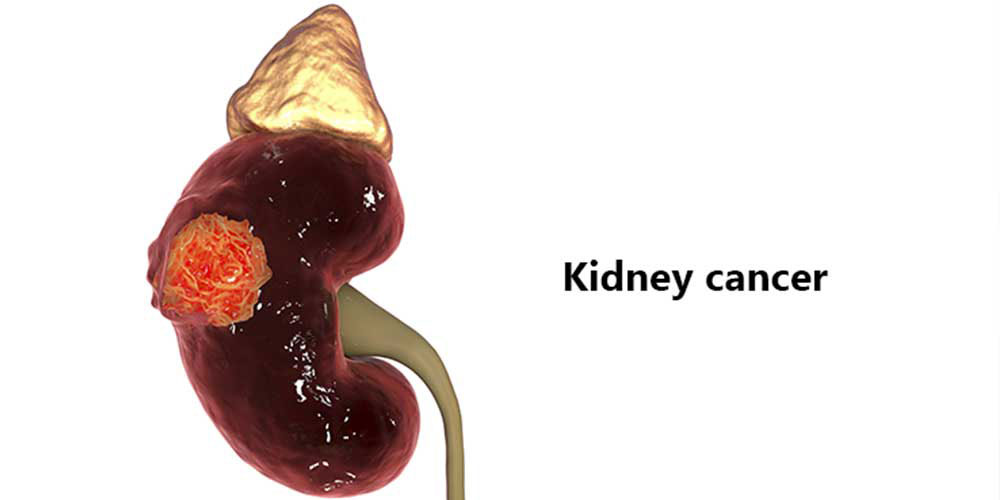
Cancer means abnormal development of cells uncontrollably. Abnormal cell proliferation leads to cancer. Cancer cells do not follow the normal mechanism of cell growth.Normally, cancer cells exist in human body, but they either die on their own or body's immune system destroys them.
Uncontrolled proliferation of cells in any part of the body means cancer. Cancer cells do not just affect one organ and may enter different organs. The more severe the disease, the more parts of the body cancer cells enter.
Kidneys are bean-shaped organs. They are located on both sides of the upper abdomen. The kidneys and adrenal glands are surrounded by a membrane of fat.Kidney cancer is on the rise, as statistics show. One reason for this may be the fact that imaging techniques such as computed tomography (CT) scans are more commonly used today.
These tests may lead to the accidental detection of more kidney cancers. Many people know exactly what is going on in their body. They do not fall and do not undergo an annual checkup, so some diseases are discovered by accident.
Kidney cancer is often detected in the early stages, when the cancer has not spread and is limited to the kidney.
The factor or factors that most often cause kidney cancer are not still accurately known. But there are risk factors that are common in most patients.
Aging, genetics, overweight and obesity, certain diseases, family history of disease are among the most common causes.
In addition, those on dialysis for kidney disease and those who have had a kidney transplant, are at increased risk for kidney cancer in long-term.
Smoking increases the risk of developing kidney cancer as well.
Inherited kidney disease is also effective. People born with certain inherited syndromes have a higher risk of developing kidney cancer.
For example, people with Von Hippel-Lindau disease, Birt-Hogg Dube syndrome, Tuberous sclerosis complex, or inherited papillary kidney cell cancer have higher risk for kidney cancer rather than people without these illnesses.
A family history of kidney cancer has a big impact. If you have kidney cancer among your first-degree relatives, you are more likely to get it.
Another risk factor that increases a person's risk of developing kidney cancer is exposure to certain chemicals such as cadmium, benzene, chemical solvents and asbestos.
However, as these cases do not necessarily lead to cancer, one may not include any of these and
See your doctor as soon as possible if you have these symptoms. In addition to examination, kidney cancer is diagnosed through blood tests, urine tests, and ultrasound.
A biopsy, which means taking a tissue from a part of the body, is a common way to diagnose cancer. In some cases, a definitive diagnosis can only be made through a biopsy. But in kidney cancer, this method is usually not needed.
Improving general health helps you to stay away from kidney cancer. If you already have 1 or more risk factors, it helps you to decrease the likelihood of getting kidney cancer.
If you want to reduce your risk of getting kidney cancer, quit smoking. There are many ways to quit. You can use the services of supporting programs, drugs and nicotine replacement products.
Try to stay in a healthy weight. If you are overweight or obese, decrease your calorie intake and increase your activity. Consult your doctor to find easy, possible ways for losing weight.
Every time you see your doctor, ask to check your blood pressure. If you have high blood pressure, you can find ways to lower it by consulting your doctor.
Changing lifestyle with having more physical activity and exercise, lose weight and following a diet help controlling blood pressure. Some may need medicines for lowering it. If you need medicine, take it regularly.
Treatment depends on a number of factors, including the type of cell, stage of the cancer, possible side effects, the patient's preferences and general health.
Kidney cancer is usually treated with surgery, immunotherapy, targeted therapy or a combination of these methods. Radiation therapy and chemotherapy are also sometimes used.
People with advanced kidney cancer, often known as metastatic cancer, often receive several types of treatment. This means that the treatments are performed one after the other.
Targeted therapy is therapy that targets cancer-specific genes, proteins, or tissue environments that help cancer grow and survive. This type of treatment blocks the growth and spread of cancer cells and limits damage to healthy cells.
The kidneys are vital organs in the human body that are responsible for disposing of waste products. The occurrence of any kind of problem in them should be taken seriously because it can be very dangerous.
If you need more information on this topic and want to consult, contact us NOW.
The consultant medical doctors of TebMedTourism Co. are at your service for free.


Communication ways:
call us: +98 912 098 5010
Visit us: 1st. Floor / No. 270 /Between Bagh & Azadi Alleyways / North Sohrevardi st. / Tehran / Iran
Mail us: [email protected]

Comments & Questions